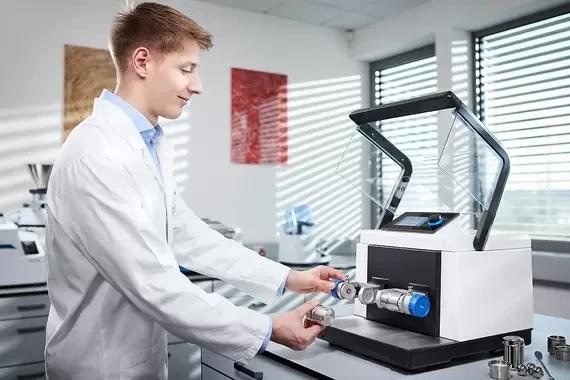The Mixer Mill MM 400 from RETSCH is an extremely versatile ball mill that has been developed for wet, dry, and cryogenic grinding of small volumes up to 2 × 20 ml. It blends and homogenizes suspensions and powders with a frequency of 30 Hz within seconds — incomparably quick and simple to operate.
The compact benchtop unit is ideal for classic homogenization processes and biological cell disruption for DNA or RNA and protein extraction. Processing times up to 99 hours make the MM 400 ideally suited for research applications, such as in mechanochemistry.
With regard to the flexibility and performance of this mill, there is no equivalent technology currently available on the market.
Users may also find the mixer mill models MM 500 nano and MM 500 vario particularly interesting, as they operate with a similar functional principle at a frequency of 35 Hz but offer considerably greater performance.
For applications that involve cooling or heating the sample, the Mixer Mill MM 500 control is the ideal choice. Each RETSCH mixer mill has a particular application focus.

Image Credit: RETSCH GmbH
Performance and Design
- Size reduction and homogenization by impact and friction with up to 30 Hz
- Two grinding stations for up to 20 samples per run
- Convenient touch display
- Memory for 12 Standard Operating Procedures (SOP) and eight program cycles
Unmatched Versatility
- Three different grinding modes: Wet, cryogenic, or dry
- Mixes powdered sample and binder in plastic vessels before pelletizing, for example, for XRF analysis
- Extraction of herbal ingredients and pesticides (QuEChERS)
- Ideal for research applications like mechanochemistry or for biological cell disruption through bead beating
Calibration Ensures Reproducible Results
Reproducibility is essential in the process chain from sampling to analysis. Laboratory equipment that can be calibrated ensures reproducible outcomes with minimum standard deviation at all times. This is especially useful when comparing results from various locations.
The MM 400 is the first laboratory mill that can be calibrated. RETSCH calibrates the time and frequency of the mill initially and provides a routine calibration service to guarantee reproducible milling processes.
This functionality is especially ideal for the following:
- Pharmaceutical products
- Testing laboratories with various locations
- Accredited labs employing ISO/IEC 17025 or ISO 9000ff
Solutions for Biological Applications and Cell Disruption
Mixer mills are utilized on a frequent basis for homogenizing biological samples. The so-called bead beating with small glass beads is an established method for cell disruption of microalgae, yeasts, and bacteria. In the process, the sample is only slightly warmed, which can be reduced to a minimum via pre-cooling.
The MM 400 enables effective cell disruption of up to 240 ml cell suspension for DNA or RNA and protein extraction. For precise diagnosis of infections, users can detach intact bacteria from tissue in 8 x 30 ml bottles or 10 x 5 ml vials by using adapters.
The MM 400 can function with a range of adapters for single-use vials with the following capacities:
- 20 × 0.2 ml
- 20 × 1.5 or 2 ml
- 10 × 5 ml
- 8 × 30 ml
- 8 × 50 ml
Conical centrifuge tubes are ideal for the pulverization of 25 g to 30 g plant material, such as cannabis flowers. Up to 8 tissue samples, such as fresh liver in buffer solution, can also be homogenized in these 50 ml tubes using steel or zirconium oxide balls.
To keep the mechanical stress on the vials as low as possible, a reduced frequency and a high filling level are recommended, e. g. with buffer and sample.
Mixer Mill MM 400 - Yeast cell disruption #RETSCH #mixermill #laboratoryinstruments
Mixer Mill MM 400—Yeast Cell Disruption. Video Credit: RETSCH GmbH
Homogenization of 8 samples of cannabis in 1 step with the MM400 mixer mill
Mixer Mill MM 400—Homogenization of cannabis. Video Credit: RETSCH GmbH